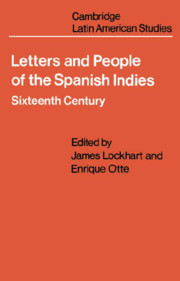Book contents
- Frontmatter
- Contents
- Preface
- Part I Conquest
- Part II The Variety of Life in the Indies
- 11 An encomendero's establishment
- 12 An encomendero's opinions
- 13 The miner
- 14 Commerce across the Atlantic
- 15 The professor of theology
- 16 The new arrival
- 17 The tanner and his wife
- 18 The troubadour
- 19 The nephew
- 20 The garden and the gate
- 21 The woman as settler
- 22 The farmer
- 23 The petty dealer
- 24 The Flemish tailors
- 25 The nobleman
- 26 The Hispanized Indian
- 27 Indian high society
- 28 An Indian town addresses the king
- Part III officials and Clerics
- Bibliography
- Index
22 - The farmer
from Part II - The Variety of Life in the Indies
Published online by Cambridge University Press: 06 August 2018
- Frontmatter
- Contents
- Preface
- Part I Conquest
- Part II The Variety of Life in the Indies
- 11 An encomendero's establishment
- 12 An encomendero's opinions
- 13 The miner
- 14 Commerce across the Atlantic
- 15 The professor of theology
- 16 The new arrival
- 17 The tanner and his wife
- 18 The troubadour
- 19 The nephew
- 20 The garden and the gate
- 21 The woman as settler
- 22 The farmer
- 23 The petty dealer
- 24 The Flemish tailors
- 25 The nobleman
- 26 The Hispanized Indian
- 27 Indian high society
- 28 An Indian town addresses the king
- Part III officials and Clerics
- Bibliography
- Index
Summary
Antonio Mateos, in Puebla, to his wife Maria Perez in Spain, 1558
… the valley of Atlixco, where they grow two crops of wheat a year …
The main areas of sixteenth-century Spanish settlement were the scene of an extraordinarily productive Indian agriculture, which would seem to have left little scope for Spanish farming. However, the Indians grew maize and other things that Spaniards would eat only from necessity. The conquerors in asking for rewards would sometimes list the eating of Indian foods among their great hardships. So from the earliest time there was a demand for meat from European livestock, as well as cereals, fruits, and vegetables of the European varieties.
At first most of this was procured through the encomienda, in a way of which we have seen an example in Letter 11. The encomendero would have one of his Spanish tribute collectors do the agricultural management, or he might hire someone especially for that purpose, usually a Spaniard on the humble side, newly arrived in the country, without many other possibilities. There would be a maintenance crew of a few blacks and permanent Indian employees, with the heavy labor of planting and harvesting done by Indians coming seasonally in fulfilment of their labor obligation to the encomendero. In the case of livestock, very little labor was required, and the small permanent crew was sufficient.
Since the Spanish cities in the central areas expanded so rapidly, in terms of both population and wealth, this system came under pressure almost immediately. Government officials, local entrepreneurs, younger relatives of encomenderos, and others who had some capital but no encomienda began to build up complexes just like those associated with the encomiendas, except for lack of rights to Indian tribute and labor. After a time of hiring seasonal labor fr∼m the encomenderos, they eventually succeeded in attaining an arrangement whereby Indian tribute labor was spread more evenly among the Spaniards and on a short-term basis, rather than being granted for a lifetime to one person in a whole area.
Even earlier and more pervasive than the large estate builders were the small fry, for food production was something susceptible of being carried out on a small scale and with little capital, and the market was increasingly good.
- Type
- Chapter
- Information
- Letters and People of the Spanish IndiesSixteenth Century, pp. 138 - 143Publisher: Cambridge University PressPrint publication year: 1976



